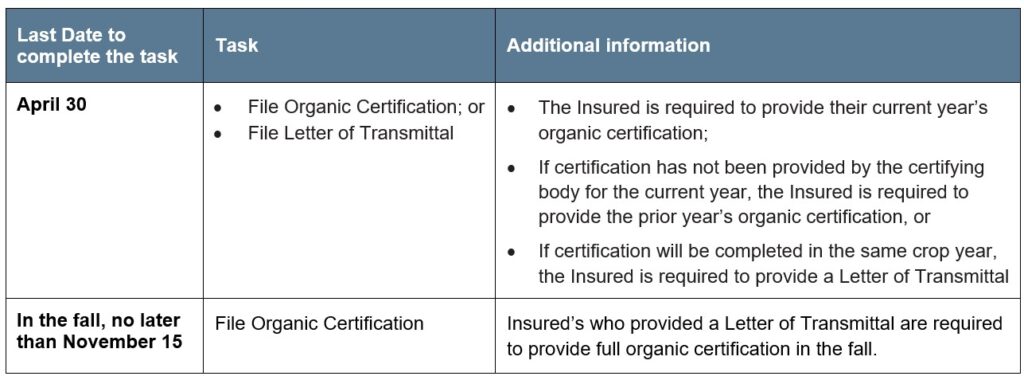Organic Crops Insuring Agreement 2025
Organic Crops Insuring Agreement
AFSC will indemnify the Insured against damage caused by Designated Perils to crops with the end use organic pursuant to this Insuring Agreement. This Insuring Agreement incorporates by reference, and is subject to, the Terms and Conditions and Benefits. The definitions in the Terms and Conditions will apply unless the same term is otherwise defined in this Insuring Agreement.
Crops insured under this Insuring Agreement shall also be insured under the following applicable Insuring Agreements:
a) Cereal and Oilseed Crops Insuring Agreement
b) Pulse Crops Insuring Agreement
If there is a conflict between this Insuring Agreement and the Cereal and Oilseed Crops Insuring Agreement or the Pulse Crops Insuring Agreement, this Insuring Agreement shall prevail.
“Insurable Crop” means Barley, Canola, Field Peas Green/Other, Field Peas Yellow, Flax, Hemp Grain, Oats, Fall Rye, Spring Rye, Spring Triticale, Winter Triticale, Canada Northern Hard Red Wheat, Canada Prairie Spring Wheat, Canada Western Special Purpose Wheat, Durum Wheat, Extra Strong Wheat, Hard Red Spring Wheat, Hard Red Winter Wheat, or Soft White Spring Wheat for milling.
a. Organic Coverage is available for Insureds who have land that is certified organic by a Canadian Food Inspection Agency approved certifying agency for the current Crop Year. This provides a higher price option for organic Insurable Crops.
a. Spring Insurance Price: In the spring, AFSC forecasts expected organic crop prices for the coming Crop Year. Dollar Coverage is determined by adjusting the Spring Insurance Price for commercial crops by set conversion factors on a crop by crop basis.
a. The Insured must be certified organic by a Canadian Food Inspection Agency approved certifying agency in the year insured. When organic certification will be obtained in the same Crop Year, a Letter of Transmittal or suitable precertification documents must be provided to AFSC by April 30.
a. If a crop is insured under this Insuring agreement, all acreage of the crop must be insured with the same end use of organic. Other crop types can be insured with a different end use (e.g. commercial, pedigreed) in the respective Insuring Agreement when insurance is available.
a. The Insured must make available to AFSC the organic certification and documents as required by AFSC. In the event that certification will be completed in the same Crop Year, clients are eligible for organic coverage at the start of the Crop Year if they provide a Letter of Transmittal or suitable precertification documents to AFSC by April 30, and full organic certification status is obtained and provided to AFSC in the fall of the same Crop Year.
a. If the Insured loses Organic certification or if the Insured does not obtain Organic certification, Coverage and Premium remains unchanged and in place as organic, and in the event of a loss, Uninsured Causes of Loss would be applied.
a. The Insurable Crop may be subject to an acceptance inspection and AFSC may, at its discretion, accept or reject insurance Coverage.
a. The Variable Price Benefit is not available under this Insuring Agreement.
If a reporting deadline date falls on a weekend, the deadline will be extended to the next Business Day.
a. The Insured is expected to use industry-recommended organic best management practices to prevent or manage weeds, pests and diseases. If the Insured fails to comply with the rules of this Insuring Agreement:
i. When production is above Coverage, Uninsured Causes of Loss may be applied;
ii. In the case of a loss, Uninsured Causes of Loss will be applied.
a. When Insured Crops are in a Production Loss, the Insured will be asked to provide their current year’s organic certificate and field diagrams.


